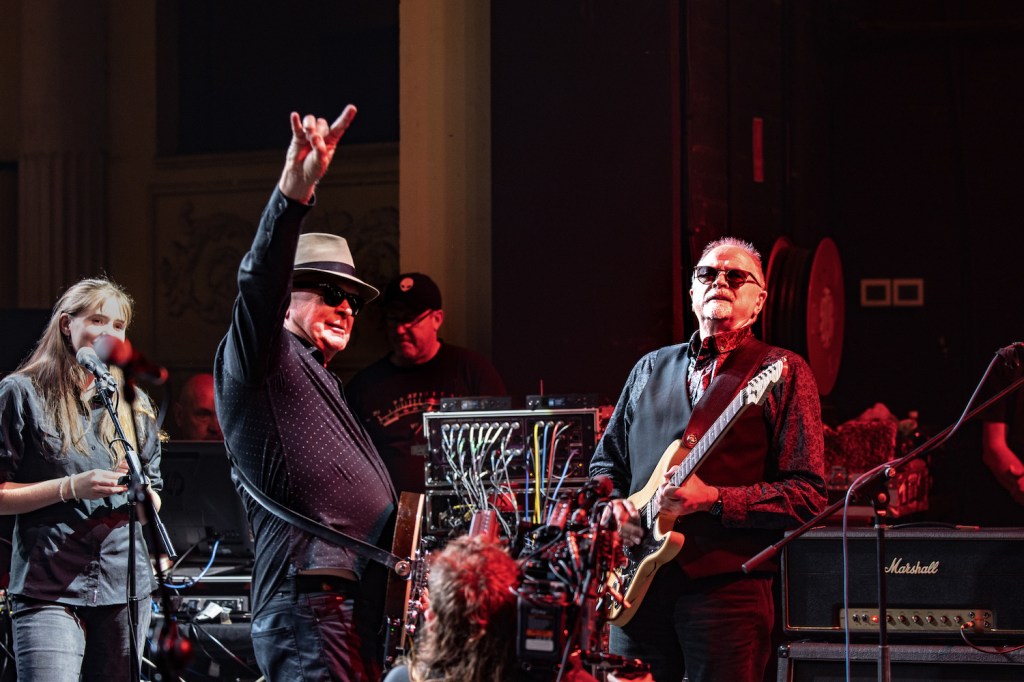When director Madeleine Parry was asked by producer Peter Hanlon to direct The Angels: Kickin’ Down the Door, about the rise and fall of the Aussie rock band, she didn’t think it would be her next project.
With past work including Hannah Gadsby comedy specials Douglas and Nanette for Netflix and the ABC’s Maddie Parry: Tough Jobs, a rock documentary didn’t feel like the next natural step.
However, she was hooked in by the story of the band’s two brothers, John and Rick Brewster, who were estranged then reunited.
“I love telling stories and I really wanted to help Peter find this story because there’s something universal here,” she tells IF.
Using archival footage, as well as animations created by Liam Somerville, the film explores the tensions that tore the band apart and helped them produce hits like Take a Long Line, Am I Ever Gonna See Your Face Again and No Secrets. Producing alongside Hanlon were Martin Fabinyi, Rick Davies and Bettina Hamilton.
Interviewees include Buzz Bidstrup, John Brewster, Rick Brewster, Brent Eccles, Doc Neeson (archive), and Nick Norton, as well as friends and family of the band.
Having worked on documentaries following serious topics, Parry thought an exploration of the raucousness of ‘70s and ‘80s Australia through a music documentary was a chance to work on lighter content.
“It was celebratory, and it was fun. It was rock and roll. But it’s not light because these are people’s lives. It’s their hopes, it’s their dreams, it’s their youth. It’s their family. Dealing with themes of betrayal, regret, and pride. I got put in my place in thinking that a music documentary would somehow be lighter.”
Parry began the process knowing that they needed to “be independent in telling the story.”
The band members were not involved in the editorial, which allowed for all different perspectives to be told. Parry able to gain the trust of various people, noting “everybody had completely different memory of how it all went down.”
One of the key challenges was telling the story of lead singer Bernard ‘Doc’ Neeson, who died in 2014.
“It’s tricky when someone’s passed away and they’re a key person in the story,” she says.
“I feel very honoured that the family and friends of Bernard trusted us to try and tell his story.”
Kickin’ Down the Door aims to allow the audience an understanding of the experience of being in a band, with Parry noting that “it’s a pretty chaotic unit and there’s so many competing agendas at play, and it’s a creative space and it’s just a bit of a mad thing to mount undertaking.”
“I think that that tension is part of what made the incredible music for The Angels.”

In crafting the film, Parry, who was also an executive producer with Mikael Borglund, tried hard to make the workplace one that she “would like to work in.”
“I don’t think that our work should kill us spiritually. I wanted it to be a place where all of the crew felt valued and had the opportunity to grow in their craft.”
In particular, she focused on upskilling those she brought on beside her. For instance, this was the first feature film for editor Emma McGavisk. Instead of hiring McGavisk as a shadow editor, Parry paired her with David Scarborough as a mentor.
“I love fostering those opportunities for people to step up,” she says.
“We were able to do that not only for Emma, but for nearly everybody on this project, it was their first feature film, including the producers. I was conscious of that and tried to provide the mentorship and the support so that it would be a great film and a really rewarding learning experience for South Australian filmmakers.”
Angels: Kickin’ Down the Door was the opening night film at the Adelaide Film Festival and will head into cinemas more broadly this Thursday via Maslow Entertainment.
With the theatrical release looming, Parry hopes that audiences who were there in the ‘70s and ‘80s “get to revisit what it was like to see the Angels live in that period” and those who weren’t “get as close as you possibly can to what was an incredibly electric live show in the context of rock and roll.”
“I want audiences to try and capture and distill the energy of the band because they were pretty phenomenal.”
There is also an opportunity to reflect “on those personal relationships, the different people in the story.”
“There’s a bit of all of them in all of us. We’ve either got siblings or we don’t have siblings, and we’ve got close friends. So, to think about those relationships in our lives which are fractured and where do you go from there? Do you repair those relationships? Do you let it go?”
As for future projects, Parry recently launched Mess Productions, with a select slate of scripted features and TV series in development.


